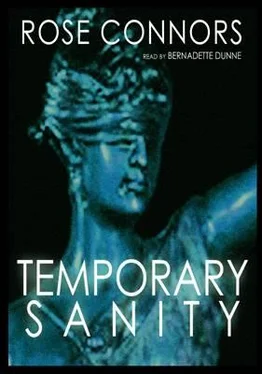“I was,” the Chief says.
“Tell us, if you would, sir, where you were at approximately four o’clock that morning.”
“At the Chatham Municipal Airport.”
“Were you alone at the airport, sir?”
“I was not.”
“Who was with you?”
“A half dozen of my own officers and four from the state barracks; two more from a neighboring town, canine handlers.”
“Anyone else?”
“Just the press. I’m not sure how many reporters and photographers were there.”
“More than ten?”
“Yes.”
“More than twenty?”
The Chief shakes his head. “Probably not.”
“Why was it, sir, that so many law enforcement officers converged on the Chatham Municipal Airport that morning?”
“We were there to receive Hector Monteros. He was coming in on a military chopper. He’d been picked up at the North Carolina border just before midnight. Federal authorities were escorting him back to Chatham at our request.”
“And why did you make that request, sir?”
Stanley pivots and looks at me. He wants to be sure I realize he’s raising the issue first-diffusing, to some extent, the impact of this testimony.
“Hector Monteros was the chief suspect in the disappearance of Billy Hammond, a seven-year-old boy from South Chatham.”
“The boy was the son of the defendant, is that correct, sir?”
The Chief looks across the room at Buck before he answers. There is, I think, genuine sympathy in his eyes.
“Yes.”
“And you wanted Monteros for questioning?”
“Well, yes, and initially, we were hoping he’d lead us to the boy-or, at least, to his remains.”
Again, a sympathetic glance in Buck’s direction.
“Did you ever get a chance to question Hector Monteros, sir?”
“No.”
“Why not?”
“He was shot as soon as he deplaned. He died on the runway.”
“Who shot him?”
The Chief looks toward Buck, not unkindly. “Mr. Hammond.”
“Are you certain?”
He nods. “Yes.”
Stanley pauses to make eye contact with the jurors. They’re with him.
“Were you aware, sir, prior to the shooting, that the defendant was present at the airport that morning?”
“No.”
“He was hiding, then.”
The Chief says nothing.
“Was he hiding, sir?”
“I didn’t know he was there.”
That’s Tommy Fitzpatrick. Just the facts.
“What happened, sir, after Mr. Hammond murdered Mr. Monteros?”
I’m up. “Your Honor…”
“Sustained. Mr. Ed-gar-ton the Third, you know better.”
Stanley offers the judge an apologetic smile. “A slip of the tongue, Your Honor.”
The judge glares at him.
“What happened, Chief Fitzpatrick, after Mr. Hammond shot Mr. Monteros?”
“We cornered him. Some of the officers tried to help Monteros, but four of us backed Mr. Hammond up against the hangar with our weapons drawn, to prevent him from fleeing the scene.”
“And?”
“It wasn’t necessary. Mr. Hammond wasn’t going anywhere.”
“What did he do?”
“He bent down, laid his rifle on the tarmac, then stood up straight and put his hands in the air.”
“What happened next?” Stanley walks closer to the jury box, moving in for the kill.
“One of my men seized the weapon. Another cuffed him. He didn’t resist. I read him his rights.”
“Did he tell you he understood his rights, sir?”
“Yes.”
“Did he seem at all disoriented?”
“No.”
“Did he seem to understand what was going on?”
“Yes.”
“Did he seem to know where he was?”
“Yes.”
“Did he seem to know who you were?”
“Yes.”
Stanley pauses and stares at the panel again. He wants them to understand that these one-word responses are important. He’ll ask them to recall these answers at the end of the trial, when they evaluate our defense in general, our temporary insanity claim in particular.
“Did the defendant seem to understand why you were placing him under arrest?”
“Yes.”
“Did he say anything to you, sir, after you read him his rights?”
Again, the Chief looks at Buck before answering. “Yes.”
Stanley clasps his hands together and rests his chin on them, facing the jurors. “What did he say?”
The Chief takes a deep breath and stares at the hat in his lap. “Well, first he jutted his chin out toward Mr. Monteros’s body.”
“And he said?”
The Chief raises his eyes from the hat and looks at the panel. “‘I wish he’d get up, so I could kill him again.’”
An armed matron leads Sonia Baker into the small cubicle facing mine. The guard cups Sonia’s elbow with one hand and rests the other on her weapon, as if she fears her prisoner might make a break for it. It’s pretty clear to me that the matron has nothing to worry about; Sonia looks like she’s sleepwalking. Her orange jumpsuit is twisted and wrinkled. It looks damp. She presses her cast against her stomach as she sits.
The matron waits until Sonia’s settled, then hands her the telephone, nods at me through the glass, and leaves us without a word.
Sonia rubs one hand across her eyes. “I took a nap,” she says into the receiver.
It must have been a long one. She looks drugged. Her lips are better, though, not so swollen. Her right eye has gone down some too, and it’s beginning to open.
“This won’t take long, Sonia. I just want you to be prepared for tomorrow morning.”
“Tomorrow morning?”
“Dr. Nelson will be here first thing.”
“Who’s he?”
“She. Prudence Nelson. She’s a forensic psychiatrist, a specialist in domestic violence.”
“A lady shrink?”
“That’s right.” Prudence Nelson has been called worse.
Sonia shakes her head and frowns. “You think I’m nuts.”
“No. I don’t.”
“Then you think I killed Howard.”
“I don’t think that either. You say you didn’t. And I believe you.” Sonia doesn’t believe me, though. She stares at the cinder-block wall behind me and shakes her head again. “Then why the shrink?”
Time for my “this is war” speech. Sonia Baker isn’t going to like what I have to say. And she might not like me after I say it. Too bad.
“Because you’re charged with first-degree murder, that’s why. Because a person charged with first-degree murder doesn’t have the luxury of tossing a viable defense out the window-even if she doesn’t like the sound of it, even if it wounds her pride.”
Sonia avoids looking at me. Her eyes roam around the room, then settle on the small, empty counter in front of her. She sets her jaw.
“Because the Commonwealth of Massachusetts intends to convict you of first-degree murder. And sometimes the Commonwealth convicts innocent people. Not on purpose. But it happens. Trust me. I know.”
Sonia’s lips part, but she says nothing. Her eyes stay fixed on the counter.
“Because in the Commonwealth of Massachusetts, women convicted of first-degree murder-guilty or not-go to MCI Framing ham, a place that makes this joint look like a spa. And they don’t leave. Ever.”
Now Sonia lowers her eyes to her lap. “Okay,” she says. “Okay. I get it.”
I wait until she raises her head, but she still doesn’t look at me. She stares at the wall again.
“I hope you do. You need to cooperate with Dr. Nelson tomorrow morning. Tell her everything.”
“Everything about Howard?”
“About Howard. About you. And about anything else she brings up. She can’t help us if you don’t.”
Sonia nods, but says nothing.
“Howard’s life is over, Sonia. There’s nothing you can do about that. But if you don’t come clean about him, yours may as well be over too.”
Читать дальше












